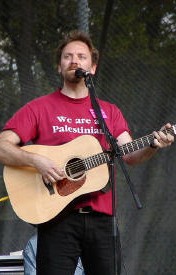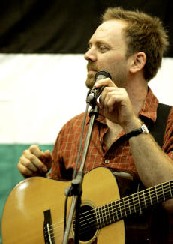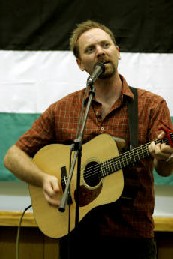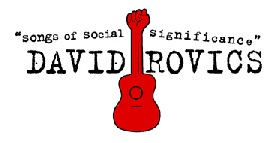FolkWorld Issue 32 12/2006; Article by Walkin' T:-)M
Radical Ideas to Hit People Pretty Hard
David Rovics and the Perfect Political Song
The U.S. American singer and songwriter David Rovics has already been hailed as the 'Pete Seeger of his time' and the 'musical version of Democracy Now!'
He would not hang a flag in his window, though George W. Bush has certainly been a great inspiration. Instead David strikes a blow against the empire.
Talking to FolkWorld, he answered where it all began and how he came about writing 'songs of social significance'.
David: I grew up in the suburbs of New York City. My parents are both professional classical musicians, and I grew up hearing old and new stuff in that tradition fairly constantly, as well as playing classical cello myself from the age of nine. Later I got into rock & roll and folk music, bluegrass, Irish and lots of other stuff.
After a long phase of being mainly into the Grateful Dead and other 60's era rock and such, I discovered songwriters like Utah Phillips [-> FW#11], Jim Page, Phil Ochs, Buffy Sainte-Marie, and re-discovered Woody Guthrie
[-> FW#31], Pete Seeger [-> FW#29] and others. They were all influences musically. I certainly learned a lot about how to be a touring musician from folks like Robert Hoyt and Chris Chandler.
What share do political songs have compared to other songs? Almost 100% I'd guess!
I guess about 90% of the material I write is political, and maybe 10% more typical love songs.
But I don't record most of them, at least not on CD.
 Main topics vary, but I've always written a lot about U.S. foreign policy, but it's so horrific and full of stuff to write about, mostly horror stories about genocide, war, and other forms of destruction, military, economic or other... Otherwise I write a lot about whatever is in the news, and other things that are inspiring because they're so rich in irony or something, like stuff that George Bush says, or stories from heroic struggles against injustice. Both have great inspirational elements for songwriting.
Main topics vary, but I've always written a lot about U.S. foreign policy, but it's so horrific and full of stuff to write about, mostly horror stories about genocide, war, and other forms of destruction, military, economic or other... Otherwise I write a lot about whatever is in the news, and other things that are inspiring because they're so rich in irony or something, like stuff that George Bush says, or stories from heroic struggles against injustice. Both have great inspirational elements for songwriting.
'Promised Land' is a song from the perspective of Mohamed Atta, one of the 9/11 assassins. Isn't that a bit too much?
Definitely not too much. The 9/11 assassins are certainly no harder to understand than say, some monster like Bush. Anybody can be understood, and should be understood, if we're to get anywhere in this world. And I actually don't think the 'terrorists' are very hard to understand. U.S. taxpayers are funding wars against so much of the Islamic world, it's no wonder that many muslims feel like it's another crusade, and that responding in kind --
fighting terror with terror -- is a sensible move from many perspectives. What must be understood first, not just euphemistically but really, truly -- is that the far bigger terrorist here is the U.S. government. In the great movie, The Battle of Algiers, there's a wonderful scene where a French stooge is asking an Algerian liberation fighter who has been captured why they send women in with baskets that explode in cafes. The Algerian fighter responds, because that's what we have to work with. You give us your jet fighters, we will happily give you our basket.
I like your tunes very much. Some songwriters concentrate on the lyrics and neglect the tune. How important is it to you?
Both are very important, and for a song to work it really has to have both elements working for it.
Very subjective and hard to say when you're exactly 'there,' but both are definitely important. In many ways what makes a perfect political song are the same things that make a perfect song generally. It has to bring the listener into the emotional space the writer is coming from. Political or not, songs are appealing to people on a mainly emotional level. They can also be informative, that's often good, often necessary, often not. But they always have to appeal emotionally, too. There are so many ways to do that.
One of my favorite is to work with a theme that has been covered a lot by the mainstream media, so people are already familiar with it and have their emotional orientation towards the subject somehow already determined.
 And then 'spin' it in a more sensible way. For example, with a song like 'The Dying Firefighter.' Everybody already knows about 9/11 in New York City [-> FW#21,
FW#22], so the images of the dying firefighter are already burned into people's psyches from CNN. So all I need do is remind people of those images and they're right with me. Then in the last couple verses of the song I bring out other things that people may not have thought about, such as the firefighters in Kabul being people too, a radical idea which can hit people pretty hard in spite of themselves.
And then 'spin' it in a more sensible way. For example, with a song like 'The Dying Firefighter.' Everybody already knows about 9/11 in New York City [-> FW#21,
FW#22], so the images of the dying firefighter are already burned into people's psyches from CNN. So all I need do is remind people of those images and they're right with me. Then in the last couple verses of the song I bring out other things that people may not have thought about, such as the firefighters in Kabul being people too, a radical idea which can hit people pretty hard in spite of themselves.
Which means trying to find an audience beyond those that 'already know'?
Sometimes I apply to play at a festival or something, so I guess I'm finding those audiences, but most of the time I get gigs thru contacts that I have, like people who signed my email list or people who find my mp3's on the web or something. It's a fairly incestuous thing, and as long as I'm doing my own booking I don't see how that might change significantly, tho it might be nice if it would. There are usually new people coming to shows, sometimes people from outside of the normal leftwing circles I usually play in, but it's always a challenge to really reach out beyond those circles. A challenge I relish, and one I try to always prepare for by writing songs that are accessible outside of the usual left crowd.
Townes Van Zandt [->
FW#26] once said that 'the only place you can get warm in this country is under the spotlights.' What does it mean singing 'songs of social significance' at this particular time of history?
There is a large and very welcoming progressive movement in the U.S., very much like in Europe or Canada or other places, tho not nearly as big as in Latin America. But they don't speak English there, so I'm stuck playing for the gringos and the Scandinavians, Brits and such. For me at this time I feel like I'm expressing popular sentiments wherever I sing, and people respond enthusiastically in many ways. The government pretty much leaves me alone. This is obviously not true for all activists, but it is true so far for me.
Is there a difference to European audiences? I understood that you picked up a particular custom in Germany: 'If the revolution starts at home, then let me tell you this: Stand up for your rights, boys, but sit down to piss!' ('Sit Down to Piss')
I tour Europe usually twice a year at least, for the past nine years or so.
 I usually spend about three months a year in Europe. Generally the European audience is very much like my audiences in the U.S. I often have a bit better attendance at European shows, especially in Scandinavia and Britain, but I mainly attribute that to the fact that I play there less often than in many parts of the U.S. There are other social differences, like there are more organized socialists and communists in Europe, and more active unions generally. But otherwise the peacenik crowd, the student crowd and the anarchist riffraff sorts are all very similar, just speaking different languages. Or speaking English with different accents.
I usually spend about three months a year in Europe. Generally the European audience is very much like my audiences in the U.S. I often have a bit better attendance at European shows, especially in Scandinavia and Britain, but I mainly attribute that to the fact that I play there less often than in many parts of the U.S. There are other social differences, like there are more organized socialists and communists in Europe, and more active unions generally. But otherwise the peacenik crowd, the student crowd and the anarchist riffraff sorts are all very similar, just speaking different languages. Or speaking English with different accents.
What do you think of today's music business?
I think it's never been worse. It's more concentrated in the hands of a small number of nasty corporations than ever before, and the 'pop stars' who are being signed these days reflect that. They're out of touch with reality and mostly fairly talentless, by and large -- with some notable exceptions, as usual. I think the internet is challenging the music industry, and it will be interesting to see what happens with that. For more on what I think of the music industry, I recommend Mat Callahan's book, 'The Trouble with Music', on
AK Press
[see review in this FW issue].
What's coming up? Learn to 'play the accordion' ('After the Revolution')?
Any political activism besides making music?
I don't have time for it, I'm very busy 'just' playing music, touring, writing songs, booking gigs, etc. But there are of course many other very important forms of activism. I'd count music among the most important, but only among. If I weren't doing music perhaps I'd get into radio programming, or some other form of journalism or writing, or maybe teaching, all such important things to do, along with so many other things that I have no stomach for, such as organizing or running for office or something.
Always lots of concerts coming up and always another record coming up...
New CD coming up in September, actually to be released via a subsidiary of EMI
[see CD reviews].
Maybe I'll get a hit or something, but I'm definitely not holding my breath!
 Website:
www.davidrovics.com
Website:
www.davidrovics.com
Discography:
Live at Club Passim (2000)
Living in These Times (2001)
Hang a Flag in the Window (2002)
Return (2003)
Songs for Mahmud (2004)
Halliburton Boardroom Massacre (2006)
Photo Credit:
(1) - (4) David Rovics (taken from website).
Back to FolkWorld Content
To the German FolkWorld
© The Mollis - Editors
of FolkWorld; Published 12/2006
All material published in FolkWorld is © The
Author via FolkWorld. Storage for private use is allowed and welcome. Reviews
and extracts of up to 200 words may be freely quoted and reproduced, if source
and author are acknowledged. For any other reproduction please ask the Editors
for permission. Although any external links from FolkWorld are chosen with greatest care, FolkWorld and its editors do not take any responsibility for the content of the linked external websites.
FolkWorld - Home of European Music

Layout & Idea of FolkWorld © The Mollis - Editors of FolkWorld
 Main topics vary, but I've always written a lot about U.S. foreign policy, but it's so horrific and full of stuff to write about, mostly horror stories about genocide, war, and other forms of destruction, military, economic or other... Otherwise I write a lot about whatever is in the news, and other things that are inspiring because they're so rich in irony or something, like stuff that George Bush says, or stories from heroic struggles against injustice. Both have great inspirational elements for songwriting.
Main topics vary, but I've always written a lot about U.S. foreign policy, but it's so horrific and full of stuff to write about, mostly horror stories about genocide, war, and other forms of destruction, military, economic or other... Otherwise I write a lot about whatever is in the news, and other things that are inspiring because they're so rich in irony or something, like stuff that George Bush says, or stories from heroic struggles against injustice. Both have great inspirational elements for songwriting.
 And then 'spin' it in a more sensible way. For example, with a song like 'The Dying Firefighter.' Everybody already knows about 9/11 in New York City [->
And then 'spin' it in a more sensible way. For example, with a song like 'The Dying Firefighter.' Everybody already knows about 9/11 in New York City [->  I usually spend about three months a year in Europe. Generally the European audience is very much like my audiences in the U.S. I often have a bit better attendance at European shows, especially in Scandinavia and Britain, but I mainly attribute that to the fact that I play there less often than in many parts of the U.S. There are other social differences, like there are more organized socialists and communists in Europe, and more active unions generally. But otherwise the peacenik crowd, the student crowd and the anarchist riffraff sorts are all very similar, just speaking different languages. Or speaking English with different accents.
I usually spend about three months a year in Europe. Generally the European audience is very much like my audiences in the U.S. I often have a bit better attendance at European shows, especially in Scandinavia and Britain, but I mainly attribute that to the fact that I play there less often than in many parts of the U.S. There are other social differences, like there are more organized socialists and communists in Europe, and more active unions generally. But otherwise the peacenik crowd, the student crowd and the anarchist riffraff sorts are all very similar, just speaking different languages. Or speaking English with different accents.

